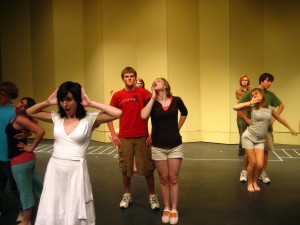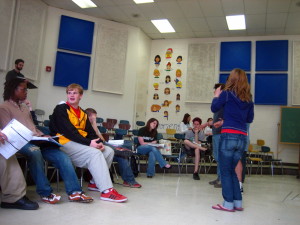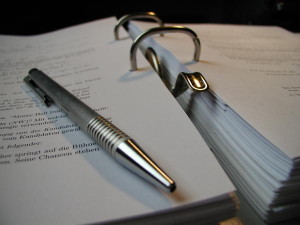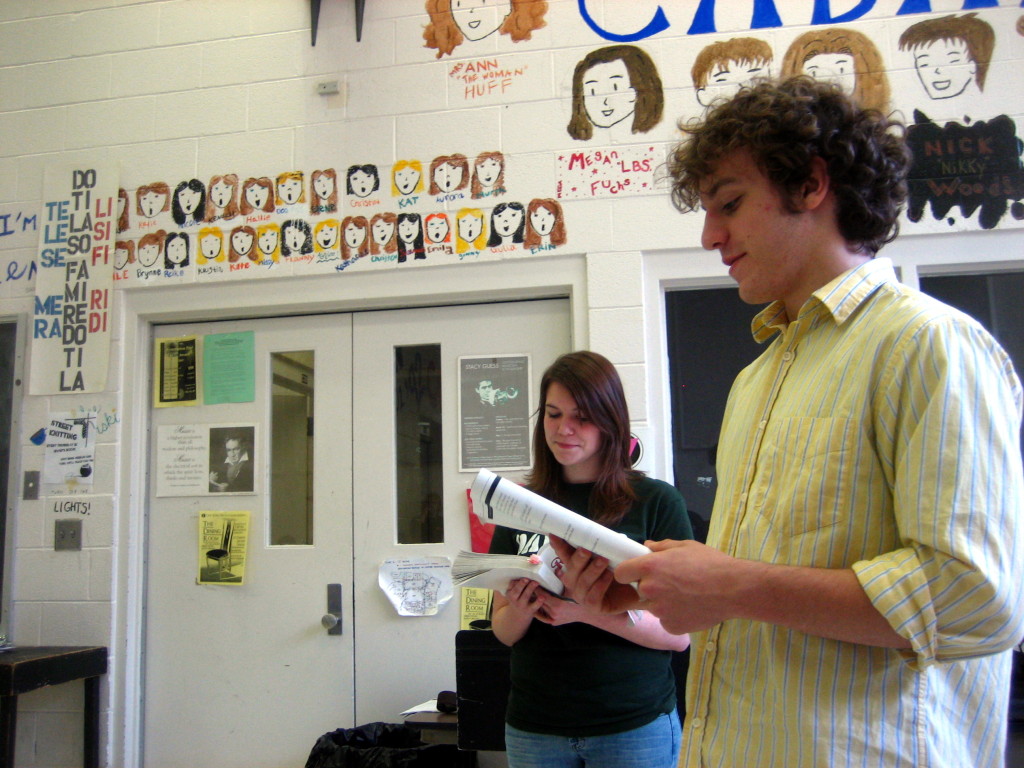Looking for intensive, personalised advice on your self-producing project? Come along to our next Self-Producing Toolkit Workshop on Saturday 12 November!
In the sixth post in her series on self-producing, Kimberley Andrews shares her experience of the rehearsal process: from finding space to the role of a writer in the rehearsal room.
By now, your show is starting to come together. You’ve booked (and probably paid at least a deposit for) your venue and you’ve managed to get a highly talented bunch of people to commit to working with you. The only way you can back out now is by faking your own death, or better still, actually dying – so if this doesn’t feel like a good option, you’d better get to work on making this the best show anyone has ever seen. How will you achieve this? You’ll rehearse the living daylights out of it, that’s how – the question is, how much rehearsal time will you actually need? And how can you make the most out of the time you have?
PLANNING YOUR REHEARSALS

Obviously, you are striving for perfection with your production and there is definitely a temptation to think you’ll need to rehearse twelve hours a day solidly for a year before your show will be performance ready. However, on a tiny budget, you’re highly unlikely to have the resources to do this – and even if you’ve got the cash to pay people to give up their lives for you for a year, would you want to? Over-rehearsing your play could make it stale before the curtain goes up.
That said, it is important to give yourself enough time to rehearse properly. I once had an actor drop out of one of my shows because he didn’t feel we had enough rehearsal time. At the time, I was bloody furious, but looking back, he had a point: no one wants to be unsure of what they are doing on stage, especially in front of an audience.
It’s all about striking a balance and figuring out what might take up extra time in rehearsal. So, yes, budget for a few extra hours if you need your actors to learn to beat box or play the ukulele but don’t expect to have the time to explore the Stanislavski method in excruciating detail. And, remember – the big sticking point in all this is that you absolutely have to be prepared to work around people’s commitments; you’ll find it much harder to get people to commit to your project if you demand loads of their time!
* All projects are different but as a rough guide, for an hour long show made up of sketches we rehearsed evenings and weekends for 3 weeks. This was worked around people’s schedules so generally, each actor would be called in for no more than 2 evenings (3 hour sessions) and one day of the weekend per week.
Top tips:
- Talk to your director, they’ll have done this before and be able to make an informed judgement about how much rehearsal you need.
- Don’t forget, in most instances, you’ll have to pay for rehearsal space so bear that in mind when deciding how many rehearsals you can afford.
- Don’t expect it to be easy: organising rehearsals on a small budget is tough and you’re likely to wish you had more time but it’s how productive you can make rehearsals that really counts.

The next step is to sort out when and where you’re going to rehearse. The first thing I did was to set up a Doodle Poll to get an idea of when my actors were available. I’ll admit, I’m the sort of saddo who gets a bit giddy over Doodle Polls but a pen and paper or carrier pigeons work just as well if that’s your thing. Once I was clear on the availability of the actors (and director) I set about the mammoth task of finding somewhere to rehearse…
FINDING SPACE
I say this is a mammoth task because like any type of space in London, rehearsal space is hard to come by and comes at a hefty price. For a one off show, your venue will usually let you in on the day a few hours before the performance but don’t bank on them giving you any more space than that (make sure you negotiate everything in writing with your venue before you start, see my previous post on this). If you’re doing a longer run or working in a bigger venue, then you might be luckier – but don’t expect anything for free. The good news is, that there are plenty of places offering rehearsal space in London at reasonable prices – it’s just a case of doing your research.
5 ways to find space:
- How big is your house? While I’m not suggesting you cram

Image by Jim Sher via Flickr Commons everyone in to your box room and use your single bed as a stage, if you do have a room in your house that’s big enough and you can boot your house-mates or relatives out, then you’ll save yourself a few quid by making use of it – particularly in the early stages when you might just be doing an initial read through of the script.
- Are you at university/ college? Or are any of your friends/ team? We managed to swing a bit of space at the University we’d studied at so it’s worth a try!
- Do you live near a community centre? Could you stop by and ask them if they could give you a room to rehearse in?
- Are you a regular customer at your local pub? Perhaps all those hours spent in your local were not wasted after all – If they have a function room and you’re friendly with them maybe they’ll think about letting you use it at a reduced rate?
- If all of the above fails: visit www.rehearsalspace.co.uk – it’s great for rehearsal space in London and you can find decent space in central locations for as little as £10/£12 per hour.
REHEARSAL SCHEDULE

Once I’d got my space sorted, the next step was to pull everything together in to a rehearsal schedule. Depending on the relationship you’ve built with your director, this might be something you’ve agreed that they do, after all, they are going to want to have some choice about what they rehearse and when. In my case, I sat down with the director to do this, which worked out well because it can be a tricky thing to work out on your own.
Here’s what we did:
- We started by getting our highlighters out and making a snazzy chart with our rehearsal times and actor availability.
- We then wrote down who was needed in each scene and used our chart to work out what scenes we could rehearse and when. This means that you won’t necessarily be able to rehearse your play ‘in order’ but it’s the best way to be economical with everyone’s time.
- We did try our best to get everyone in for an initial read through at the start of rehearsals (more on this in the next section).
- We tried to be considerate with people’s time. For example, if you’re rehearsing a scene with Cumberbatch in it on Saturday morning at 10am, don’t make him stick around all day to do another scene at 5pm, try to do them all in one go if you possibly can. He’s a busy guy, you know.
THE INITIAL READ-THROUGH

This is the bit where everyone sits down for the first time and reads your play together; it’s a pretty momentous moment where you get to hear your wonderful actors read out your words in all their glory. And it’s not just a chance for you to take stock of what a flippin’ literary genius you are. This is a chance for the whole team to hear what the play sounds like and for anyone to ask questions. Unless anything drastic happens (and small typo’s aside)this is kind of the last point where you can make a few edits (I’m talking small things here though, not a complete rewrite). And, if you’re handing over the play for someone else to direct, it’s probably the last point where questions on editing will be aimed at you.

Top tips:
- Do the prep – print copies of the script off for everyone before you start and make sure you’ve emailed everyone with the location of rehearsals (including your phone number, particularly if you’re in a building where people need a code to get in!)
- Don’t panic if not all of your actors can make it: ask a mate to stand in if you can, it’ll still be helpful to get an overview of the piece.
- Don’t be defensive or offended if your work is ‘mis-understood’ and if there is something that can’t be clarified with an explanation from you, be prepared to tweak the script a little.
- Be open to suggestions or new ideas but also stand firm if there are things you feel strongly about (this is where it helps if you’re comfortable with the director and have discussed the play beforehand).
- Make notes on your script as you go along and ask actors to do the same. Only re-type pages where you’ve made a lot of edits – if it’s just tweaking individual lines, let the actors scribble changes on their scripts and you’ll save paper, time and money!
REHEARSALS
So, all that’s left to do now is actually get cracking with rehearsals. But where does that leave you as the writer? If you were working with a theatre or larger company, there’s a good chance you’d only be invited to rehearsals as an observer but this different, right? You haven’t simply handed over your script for someone else to rehearse, you’ve laboured over producing the whole damn thing – so, surely you should be able to give your input during rehearsals? Well, in short, not really. If you’ve taken on a director, then you do need to let them direct, if you keep chiming in with your two-pence worth, you could end up slowing down the rehearsal process…too many cooks and all that. So, what should you be doing during the rehearsal period then? Sleeping? Giving yourself a pedicure? Or how about making yourself useful?
How to be useful in rehearsals:
- Use the process to improve your writing: take notes on the bits which actors find it difficult to interpret or the things that don’t sound so great to you when read aloud.
- Be diplomatic. If you have a major problem with how things are working, talk to the director at the next pause, rather than wading in and stopping the action – it might be that your director is just finding their feet too.
- Be approachable: make it clear that you are open to questions or suggestions and you’re willing to offer the team support if they need it.
- Do stuff: compile a props list, do the sandwich run or do some work on marketing your show (which, as it happens, I’ll be talking about in my next post).
- Be a calming influence, not a force of chaos.

On a final note, accept that the whole process of rehearsing a show on a shoestring budget is stressful, nerve-wracking and there is never, ever enough time. But it’s still a really valuable experience for an emerging writer and you won’t be helping your work realise it’s true potential if you bring unnecessary stress to the table.
Previous Posts:
Part 1: Getting Started
Part 2: Finding a venue
Part 3: Budget & Profit
Part 4: Building your Team
Part 5: Casting
In my next post I’ll be discussing marketing – how to find an audience, who you should invite and how to advertise your show.


Pingback: Opportunities Weekly Round-up: 4 November 2016 | LONDON PLAYWRIGHTS BLOG